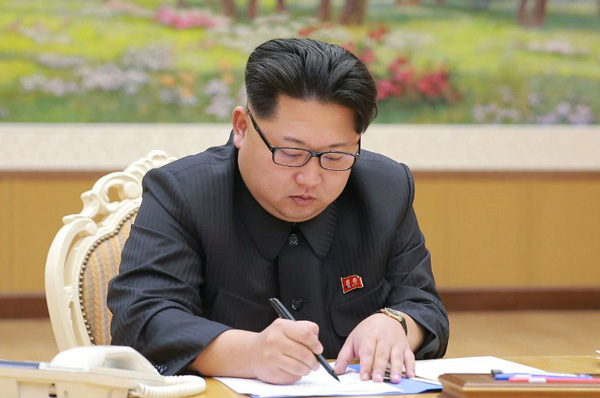Was the H-bomb test for real? World bombs North Korea with doubts

Chinese cities near the North Korean border were jolted by tremors of 5.1-magnitude on the morning of 6 January (or January 6). However, it wasn't seismic activity that shook the cities, but a bomb.
North Korea had tested its hydrogen bomb. Or had it?
The joyful announcer on state television spoke of the "perfectly successful" test that had taken the country's "nuclear might to the next level".
The official statement, translated by NPR, read: "This test, which relied 100% on our wisdom, our technology and our power, we have proved the accuracy of the technological resources behind our newly developed test hydrogen bomb. We have also proved scientifically the power of miniaturised hydrogen bomb."
Yet doubts prevail.
Was it really an H-bomb?
"The seismic data that's been received indicates that the explosion is probably significantly below what one would expect from an H-bomb test," Crispin Rovere, an Australian nuclear policy and arms control specialist, told AFP.
"So initially it seems to be that they've successfully conducted a nuclear test but unsuccessfully completed the second-stage hydrogen explosion."
It will, in all likelihood, be weeks before the US and other powerful nations determine what kind of test really took place.
The US Geological Survey detected an earthquake close to the North Korean city of Kilju, which is home to the Punggye-ri nuclear test site where three previous blasts - in 2006, 2009 and 2013 - have taken place.
Some like Joe Cirincione of the Ploughshares Fund, which works on nuclear disarmament, questioned whether it truly was a hydrogen bomb. Also, if it was truly a hydrogen bomb, the quake would have been much larger.
I doubt DPRK exploded a real H-Bomb. More likely a "boosted" weapon with tritium added to increase the yield of a fission bomb.
- Joe Cirincione (@Cirincione) January 6, 2016If true, then it would signal a significant escalation in North Korea's weapons arsenal.
Violation of resolution
Ahead of a meeting with the United Nations Security Council, Secretary General Ban Ki-moon had this to say: "This test once again violates numerous Security Council resolutions despite the united call by the international community to cease such activities...It is also a grave contravention of the international norm against nuclear testing. I demand the DPRK (North Korea) cease any further nuclear activities and meet its obligations for verifiable denuclearisation."
The UN met during an emergency session on whether to consider tightening economic sanctions. As it stands, North Korea's economy is bankrupt and usually, China opposes tougher measures.
BREAKING: UN Security Council "strongly condemns" North Korean nuclear test and pledges to pursue new sanctions.
- The Associated Press (@AP) January 6, 2016US Secretary of State John Kerry called the testing provocative.
"This highly provocative act poses a grave threat to international peace and security and blatantly violates multiple UN Security Council resolutions."
US President Barack Obama's spokesperson Josh Earnest disputed North Korea's claims of a "successful" hydrogen bomb test. "The initial analysis that has been conducted... is not consistent with North Korean claims of a successful hydrogen bomb test."
United States President Barack Obama's spokesperson Josh Earnest has also disputed North Korea's claims of a successful hydrogen bomb test
All 15 members of the UN Security Council, including North Korea's close ally such China, condemned the nuclear test, calling it "a clear threat to international peace and security".
What is an H-bomb?
A hydrogen bomb is far more powerful than a nuclear bomb. Also known as a thermonuclear bomb, it forces together hydrogen isotopes under extremely high temperatures to form helium. The process is known as nuclear fusion. Essentially, it uses the energy released from the combination of two light atomic nuclei.
One way to build a device that is more powerful than an atomic bomb but not exactly a hydrogen bomb is by putting at its core a small amount of tritium, a radioactive form of hydrogen. That bomb is one level away from truly being a hydrogen bomb.
On the other hand, the atom bomb uses the energy released when a heavy atomic nucleus splits in a process known as nuclear fission. American scientists created the hydrogen bomb, which was first tested in 1952.
The announcement
In December, the Supreme leader of the Democratic People Republic of Korea, Kim Jong-un, announced his country had successfully developed technologies to build thermonuclear weapons. Experts remained skeptical at the time, and still are.
The US administration, along with the South Korean government, has managed to defuse heightened tensions in the past by offering concessions, including aid, in exchange for North Korea promising to end its nuclear weapons programmes.

Analysts believe North Korea is once again seeking aid. Others simply believe North Korea wants to be recognised as a nuclear state, just like Pakistan. There are also those who say North Korea genuinely fears an attack from the US or South Korea and views these tests as a deterrent.
Japan's Prime Minister Shinzo Abe called the test a "serious threat" to his nation's security. This "cannot be tolerated," he said and pledged Japan will frame a "firm response".
A "robust international response" will be discussed by the UN Security Council members, confirmed Britain's Foreign Secretary Philip Hammond.
Why conduct this test now?
Kim Jong-un is constantly trying to solidify his power base and demonstrate achievements that are even greater than those of his father and grandfather.
Significantly, the test was conducted two days before his birthday on 8 January. It also precedes an expected congress of North Korea's ruling Workers' Party, the first such gathering in 35 years.
The test was conducted to display to the world that North Korea has acquired new technologies to further its nuclear weapons programme.
As Crispin Rovere tweeted, North Korea always does this at strategic times.
Looks like North Korea want to gatecrash the US election party: #nucleartest #election2016
- Crispin Rovere (@crispinrovere) January 6, 2016North Korea always does something to get attention from the US at the end of a presidency (in order to negotiate) #nucleartest
- Crispin Rovere (@crispinrovere) January 6, 2016Should US be scared?
In 2012, North Korea launched a rocket that put its first satellite into orbit. This raised possibilities of intercontinental ballistic missiles that could potentially reach the US (distance from the capital is 10,850 km).
The UN Security Council condemned the launch as a violation and heightened sanctions against North Korea. If a missile was to be headed for land, the US would use its interception technology. If it was headed for water, then the countries would just ignore it.
The seismic data that's been received indicates that the explosion is probably significantly below what one would expect from an H-bomb test
In the worst case scenario, in case of a more direct attack, the US and South Korea, and maybe Japan, would respond and all hell may break loose. It's unlikely China would respond in any situation unless directly provoked.
The response
- Each and every time North Korea has launched a rocket, global criticism has gotten stronger.
- In 1998, Japan temporarily cut off contribution towards an energy project in North Korea when a Taepodong missile flew over Japan.
In 2006, when North Korea launched another long-range missile, many countries started imposing sanctions. The Security Council added economic sanctions.
In 2009, North Korea launched the three-stage Unha-2 rocket, which failed. The Security Council strengthened punitive measures.
- In 2012, the US cancelled its food aid after North Korea tried to launch a more advanced missile, the Unha-3. Later, North Korea succeeded in lifting a small satellite into orbit. After that, the Security Council once again tightened sanctions. China too participated in writing painful new sanctions.
Current sanctions
- Since 2006, the Security Council has passed four resolutions aimed at penalising North Korea for its nuclear weapons programme.
The US, strongly opposed to North Korea, has imposed its own regimen of strict economic sanctions. These include freezing all North Korean property interests in the US and banning the import of most goods and services.
The UN has prohibited North Korea from conducting nuclear tests or launching ballistic missiles. It has also requested that North Korea abandon all future efforts to pursue nuclear weapons.
The UN has also urged North Korea to return and negotiate with China, Japan, Russia, South Korea and the US, which make up the six-party talks.
There are embargoes on large-scale arms, weapons-related research and development materials.
- Many types of financial transactions have been banned.
What does it mean?
This marks a new low in relations between North Korea and China.
It's a "slap in the face to China", as journalist Mike Chinoy put it. For one, China's patience has run out. It strongly opposes Pyongyang's nuclear development. The furtherance of its nuclear programme is a factor for instability on the Korean Peninsula. That means it could disrupt its strong trade relations with North Korea's closest rivals, South Korea.
"Beijing will face increased pressure both domestically and internationally to punish and rein in Kim Jong-un and to ultimately force Pyongyang to give up its nuclear weapons," Yanmei Xie, International Crisis Group's Senior Analyst of Northeast Asia, told AFP.
The future lies with China, as an immediate neighbour and one of the strongest nations out there. "The last thing it (China) wants is chaos on its border resulting in economic disruption or a migration crisis," Timothy Stafford, research analyst on nuclear policy at the London-based Royal United Services Institute, told NBC News.
China has two moves here. It can either exert heavier economic pressure on North Korea as punishment for the test or it can maintain status quo for fear of the nation's collapse in future. China may be a long standing ally (one of the very few) of North Korea, but it stands to lose from nuclear escalation.
China may just end up looking at its partners beyond the seas for help in this situation. Negotiations are nowhere near close to happening as North Korea seeks to boost his negotiating powers with the US, especially with Obama in his last year of presidency.







![BJP's Kapil Mishra recreates Shankar Mahadevan’s ‘Breathless’ song to highlight Delhi pollution [WATCH] BJP's Kapil Mishra recreates Shankar Mahadevan’s ‘Breathless’ song to highlight Delhi pollution [WATCH]](https://images.catchnews.com/upload/2022/11/03/kapil-mishra_240884_300x172.png)

![Anupam Kher shares pictures of his toned body on 67th birthday [MUST SEE] Anupam Kher shares pictures of his toned body on 67th birthday [MUST SEE]](https://images.catchnews.com/upload/2022/03/07/Anupam_kher_231145_300x172.jpg)






